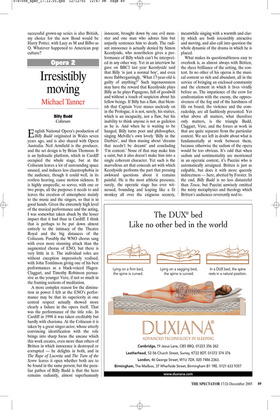Irresistibly moving
Michael Tanner
Billy Budd Coliseum English National Opera’s production of Billy Budd originated in Wales seven years ago, and is also shared with Opera Australia. Neil Armfield is the producer, and the set design is by Brian Thomson. It is an hydraulic platform, which in Cardiff occupied the whole stage, but at the Coliseum leaves a lot of surrounding space unused, and induces less claustrophobia in the audience, though it could well, in its restless heaving, cause motion sickness. It is highly unspecific, so serves, with one or two props, all the purposes it needs to and leaves the creation of atmosphere mainly to the music and the singers, so that is in good hands. Given the extremely high level of the musical performance and the acting, I was somewhat taken aback by the lesser impact that it had than in Cardiff. I think that is perhaps to be put down almost entirely to the intimacy of the Theatre Royal and the big distances of the Coliseum. Possibly the WNO chorus sang with even more stunning attack than the augmented chorus of ENO, but there is very little in it. The individual roles are without exception impressively realised, with John Tomlinson giving one of his best performances as a black-voiced HagenClaggart, and Timothy Robinson persuasive as the younger Vere, if not so much in the framing sections of meditation.
A more complex reason for the diminution in power I felt at the ENO’s performance may be that its superiority in one central respect actually showed more clearly a failure in the opera itself. That was the performance of the title role. In Cardiff in 1998 it was taken creditably but hardly with charisma. At the Coliseum it is taken by a great singer-actor, whose utterly convincing identification with the role brings into sharp focus the unease which this work creates, even more than others of Britten in which innocence is destroyed or corrupted — he delights in both, and in The Rape of Lucretia and The Turn of the Screw leaves it open whether both are to be found in the same person; but the peculiar pathos of Billy Budd is that the hero remains radiantly, almost superhumanly innocent, brought down by one evil monster and one man who adores him but unjustly sentences him to death. The radiant innocence is actually denied by Simon Keenlyside, who nonetheless gives a performance of Billy which can’t be interpreted in any other way. Yet in an interview he gave on BBC3 last year Keenlyside said that Billy ‘is just a normal boy’, and even more flabbergastingly, ‘What 17-year-old is guilty of anything?’ Such ingenuousness may have the reward that Keenlyside plays Billy as he plays Papageno, full of goodwill and without a touch of suspicion about his fellow beings. If Billy has a flaw, that blemish that Captain Vere muses uselessly on in the Prologue, it is not, surely, his stutter, which is an incapacity, not a flaw, but his inability to think anyone is not as guileless as he is. And when he is waiting to be hanged, Billy turns poet and philosopher, singing Melville’s own lovely ‘Billy in the Darbies’, and then musing about ‘dreams that needn’t be dreamt’ and concluding ‘I’m content.’ None of that may make him a saint, but it also doesn’t make him into a single coherent character. Yet such is the marvellous art that conceals art with which Keenlyside performs the part that pressing awkward questions about it remains painful. He is the most athletic presence, surely, the operatic stage has ever witnessed, bounding and leaping like a fit monkey all over the exiguous scenery, meanwhile singing with a warmth and clarity which are both irresistibly attractive and moving, and also call into question the whole dynamic of the drama in which he is placed.
What makes its questionableness easy to overlook is, as almost always with Britten, the sheer brilliance of the setting, the context. In no other of his operas is the musical content so rich and abundant, all in the service of bringing an enclosed community and the element in which it lives vividly before us. The impatience of the crew for confrontation with the enemy, the oppressiveness of the fog and of the harshness of life on board, the violence and the comradeship, are all faultlessly presented. Yet what above all matters, what therefore only matters, is the triangle Budd, Claggart, Vere, and the forces at work in that are quite separate from the particular context. We are left in doubt about what is fundamentally at work between them, because otherwise the sadism of the opera would be too obvious. It’s odd that when sadism and sentimentality are mentioned in an operatic context, it’s Puccini who is automatically arraigned. Britten is just as culpable, but does it with more queenly indirectness — here, abetted by Forster. In the end, Billy Budd is no less distasteful than Tosca, but Puccini unwisely omitted the misty metaphysics and theology which Britten’s audiences reverently nod to.


















































































 Previous page
Previous page